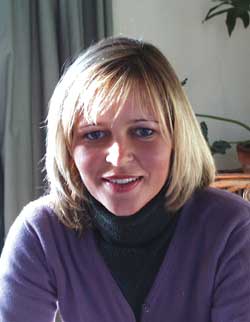 If you close your eyes when you speak to Helen Eikeland, you could easily imagine you are talking to someone born in Gorkha. And you'd be right.
If you close your eyes when you speak to Helen Eikeland, you could easily imagine you are talking to someone born in Gorkha. And you'd be right. The 34-year-old Norwegian was born in Ampipal, where her father was a teacher at the famous Luitel School run by the United Mission Nepal. She was born at home, Nepali-style, and was named after a Canadian doctor at the Ampipal Hospital who helped in the delivery. Helen grew up in Gorkha and Kathmandu till she was eleven, and her mother encouraged her to go out and play guccha and luka mari with her Nepali friends on Ampipial Bhanjyang, fly changa in Sanepa, munch makai and titaura with the didis who also picked jumra from her hair (jumra change their colour chameleon-like, so Nepali jumra turned blonde in Helen's hair).
It was this total immersion in Nepal that gave Helen her fluent, unaccented Nepali. We have heard a lot of foreigners speak Nepali: British Gurkha officers, Peace Corps volunteers, and Jesuit Priests, but there aren't many with Helen's colloquial smoothness. "Malai Nepali maya garaune mero buwa nai ho," Helen says about how her father passed on his love and respect for the Nepali people to her. "He taught us to appreciate what was good in the Nepali way of life, and be a part of the language and the culture."
After going back to Norway at age 11, Helen managed to infect her friends in school with her love for Nepal. They memorised Nepali songs that she sang, and one of Helen's Norwegian friends who has never been to Nepal can sing Narayan Gopal songs by heart to this day.
Helen returned to Nepal in 1994 with her husband Harald, joining the UMN, and both now teach at Mahendra Bhawan School. "I wasn't going to marry anyone who wasn't prepared to return to Nepal with me," she says. And Harald has learnt Nepali as well. "Being married to someone so dedicated to Nepal, you have to," he quips.
Helen sometimes meets Nepalis she grew up with in the most unusual places: like a childhood friend from Sanepa she ran into after 25 years--at Vienna airport. Both recognised each other immediately. Returning to Nepal has given Helen a chance to fulfil her lifelong dream of helping her other motherland. "Nepal is going through a difficult period," she says in flawless Nepali, "but I know first hand about how strong and resilient Nepalis are. We will pull through this."
We like the "we".


